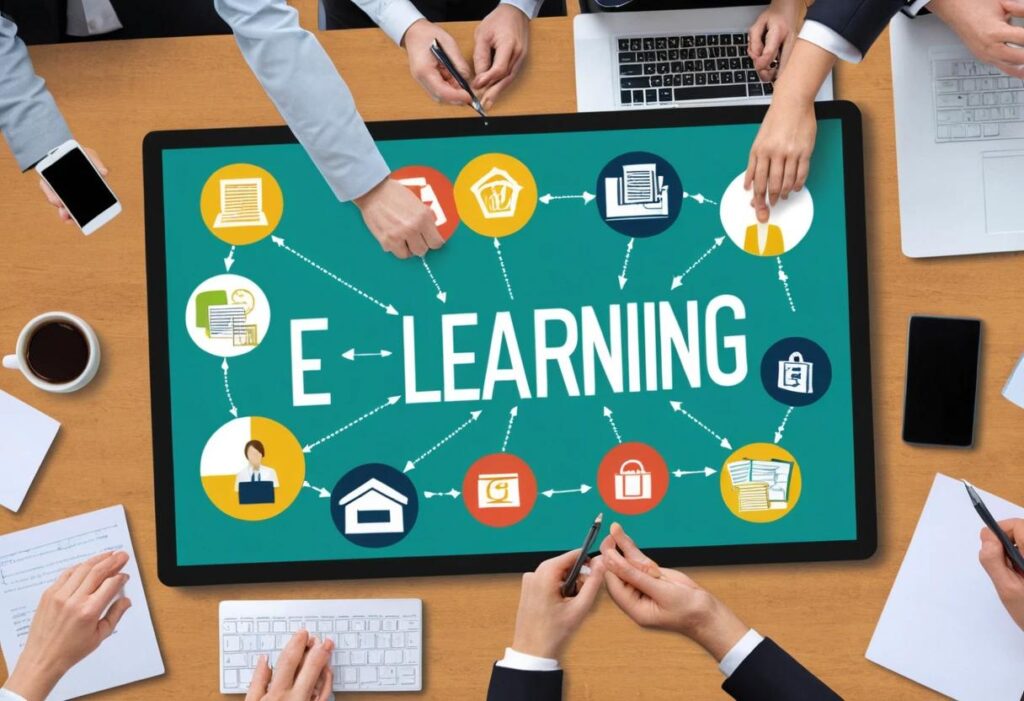E-learning platforms in human resource management have revolutionized the way organizations deliver training and development programs. These platforms provide flexible, accessible, and cost-effective solutions to upskill employees and enhance their productivity. By leveraging advanced technologies, HR professionals can create engaging learning experiences that cater to diverse employee needs. In this article, we’ll explore the importance and benefits of e-learning platforms in human resource management.
What Are E-Learning Platforms in HRM?
E-learning platforms in human resource management are digital tools and systems that facilitate the delivery of training and development programs online. These platforms provide employees with access to a wide range of learning materials, such as courses, videos, and interactive modules, from any location and at any time.
E-learning platforms in HRM enable organizations to streamline training processes, track employee progress, and customize learning paths based on individual needs. By integrating these platforms, HR teams can efficiently enhance workforce skills, improve engagement, and support continuous professional development.
Different Types of E-Learning Platforms in Human Resource Management
Overview of Different Types of E-Learning Platforms in Human Resource Management
- Learning Management Systems (LMS)
LMS platforms are widely used in human resource management to create, deliver, and manage online training programs. They offer features like progress tracking, reporting, and course customization, making them ideal for corporate training and compliance education. - Massive Open Online Courses (MOOCs)
MOOCs provide open-access online courses from universities and institutions, allowing employees to gain specialized knowledge. These platforms, such as Coursera and edX, are useful for professional development and upskilling in specific domains. - Corporate E-Learning Platforms
These platforms, tailored for businesses, offer customized content and advanced analytics. Examples include LinkedIn Learning and Udemy for Business, which provide targeted training for workforce needs. - Microlearning Platforms
Microlearning platforms focus on delivering concise, bite-sized lessons designed for quick consumption. They are particularly effective for just-in-time learning and addressing specific knowledge gaps. - Gamified Learning Platforms
These platforms use gamification techniques, such as leaderboards, badges, and challenges, to make training more engaging and interactive, boosting participation and retention. - Social Learning Platforms
Designed for collaborative learning, these platforms enable peer-to-peer interaction through forums, discussion boards, and group projects, fostering a community-driven approach to training. - Mobile Learning Platforms
Mobile-first platforms allow employees to access training materials on their smartphones or tablets, providing flexibility and convenience for on-the-go learning.
By leveraging these different types of e-learning platforms in human resource management, organizations can create dynamic and effective training solutions tailored to diverse learning needs and preferences.

Importance of E-Learning Platforms in HRM
Importance of E-Learning Platforms in Human Resource Management
- Flexibility and Accessibility
E-learning platforms in human resource management allow employees to access training materials anytime and anywhere, enabling learning at their own pace and convenience. - Cost-Effectiveness
By eliminating the need for physical classrooms and in-person trainers, e-learning platforms reduce training costs while providing high-quality content. - Scalability
These platforms support the simultaneous training of large numbers of employees, making them ideal for growing organizations or those with global teams. - Personalized Learning
E-learning platforms enable HR professionals to create customized learning paths that cater to individual employee needs and career goals. - Improved Employee Engagement
Interactive features like quizzes, gamification, and multimedia content make training more engaging, increasing participation and retention rates. - Real-Time Tracking and Reporting
HR teams can monitor progress, assess performance, and gather insights on training effectiveness using analytics and reporting tools. - Continuous Learning and Development
E-learning platforms promote a culture of continuous improvement by providing employees with ongoing access to new skills and knowledge. - Adaptability to Changing Needs
Organizations can quickly update content to keep up with industry trends, ensuring that employees stay relevant and competitive.
E-learning platforms in human resource management are essential for delivering effective, efficient, and engaging training programs that support both employee growth and organizational success.
Read Also : Comprehensive Guide to Performance Reviews in Human Resource Management
Key Features of E-Learning Platforms for HRM
Key Features of E-Learning Platforms for Human Resource Management
- Customizable Content
E-learning platforms in HRM allow organizations to create and tailor courses to meet specific training objectives and employee needs. - Progress Tracking and Analytics
Advanced tracking tools enable HR teams to monitor employee progress, completion rates, and performance metrics, providing insights into training effectiveness. - Gamification Elements
Features like leaderboards, badges, and rewards make learning interactive and engaging, encouraging participation and retention. - Mobile Accessibility
Mobile-friendly platforms allow employees to access training materials on their smartphones or tablets, providing flexibility for on-the-go learning. - Integration Capabilities
E-learning platforms can integrate with HR software, such as Learning Management Systems (LMS) and Human Resource Information Systems (HRIS), for seamless data management. - Interactive Content
Incorporates videos, quizzes, simulations, and other interactive elements to create engaging and immersive learning experiences. - Personalized Learning Paths
Employees can receive customized training plans based on their roles, skills, and career goals, ensuring targeted and relevant learning. - Compliance and Certification Management
Platforms often include features for tracking compliance training and generating certifications, ensuring adherence to regulatory requirements. - Social Learning Tools
Facilitates collaboration through discussion forums, peer reviews, and group projects, fostering a community-driven learning environment. - Multilingual Support
Supports diverse workforces by offering training materials in multiple languages, enhancing accessibility and inclusivity.
By incorporating these features, e-learning platforms in human resource management empower organizations to deliver efficient, engaging, and impactful training programs.
elearning and human resource development
eLearning has transformed the landscape of Human Resource Development (HRD) by making training more accessible, scalable, and personalized. Through online platforms, HR departments can deliver skill-building programs, compliance courses, and leadership training to employees anytime, anywhere—breaking the limitations of traditional classroom models.
How eLearning Enhances HRD:
-
Cost-Efficiency: Reduces training expenses by eliminating travel and printed materials.
-
Scalability: Easily delivers consistent content to large, dispersed workforces.
-
Personalization: Tailors learning paths based on roles, skill gaps, or performance data.
-
Real-Time Tracking: Offers analytics to monitor engagement and outcomes.
-
Agility: Enables rapid updates to training content in response to business changes.
By integrating eLearning into HRD strategies, organizations not only upskill their talent more effectively but also foster a culture of continuous learning and innovation.
How E-Learning Supports Other HR Functions
How E-Learning Supports Other HR Functions
- Recruitment and Onboarding
E-learning platforms in human resource management streamline the onboarding process by providing interactive modules that introduce new hires to company culture, policies, and job-specific training. - Performance Management
E-learning tools help employees address performance gaps through targeted training programs that align with performance review feedback and development goals. - Succession Planning
E-learning supports succession planning by providing leadership development courses and skill-building resources to prepare high-potential employees for future roles. - Diversity and Inclusion
E-learning platforms deliver training on topics like unconscious bias, cultural sensitivity, and inclusive practices, fostering a more equitable workplace. - Compliance and Risk Management
These platforms provide easily accessible compliance training, ensuring employees understand and adhere to legal and regulatory requirements. - Employee Engagement
Interactive and gamified e-learning courses keep employees engaged, enhancing their satisfaction and commitment to organizational goals. - Career Development
E-learning supports continuous professional growth by offering courses aligned with employees’ career aspirations and skill-building needs. - HR Analytics and Reporting
Integrated e-learning platforms provide data on training completion, performance, and engagement, supporting HR in making informed decisions. - Change Management
E-learning equips employees with the skills and knowledge needed to adapt to organizational changes, such as new technologies or processes. - Retention Strategies
Providing access to ongoing learning opportunities through e-learning demonstrates an organization’s commitment to employee development, boosting retention rates.
By integrating e-learning platforms in human resource management, organizations can enhance various HR functions, driving efficiency, engagement, and long-term success.
Read Also : Comprehensive Guide to Leadership Programs in Human Resource Management

Challenges in Implementing E-Learning Platforms
Challenges in Implementing E-Learning Platforms in Human Resource Management
- Employee Resistance
Employees may resist transitioning to e-learning due to a lack of familiarity with digital platforms or a preference for traditional learning methods. - Technical Issues
Poor internet connectivity, outdated devices, or platform compatibility issues can hinder the seamless delivery of e-learning programs. - Content Relevance
Developing or sourcing training materials that are engaging, up-to-date, and aligned with organizational goals can be time-consuming and resource-intensive. - Cost Constraints
The initial setup cost of e-learning platforms, including subscriptions, development, and integration with existing systems, may strain budgets. - Limited User Engagement
Without interactive elements or engaging content, employees may lose interest, resulting in lower completion rates and reduced effectiveness. - Inadequate Training for Use
Employees and HR teams may require training to navigate and utilize e-learning platforms effectively, adding to the implementation timeline. - Lack of Personalization
Generic content may fail to address specific employee needs or organizational objectives, limiting the impact of the training. - Measuring Effectiveness
Organizations may struggle to track the success and ROI of e-learning programs without robust analytics and evaluation tools. - Integration with Existing Systems
Aligning e-learning platforms with other HR tools, such as Learning Management Systems (LMS) or HRIS, can pose technical challenges. - Language and Cultural Barriers
Global teams may face challenges in accessing training materials due to language differences or cultural relevance of content.
Addressing these challenges requires strategic planning, clear communication, and a focus on employee engagement to ensure the successful adoption of e-learning platforms in human resource management.
Read Also : A Comprehensive Guide to HR Responsibilities: Key Functions and Strategic Importance
Best HR Training Platforms
HR training programs are essential for building skilled professionals and enhancing organizational performance. Below is a curated list of the most reputable HR training providers worldwide, suitable for individuals and corporate teams alike.
1. BMC Training – Your Partner in Effective Training Solutions
-
Specialization: Professional HR training, leadership development, organizational management, and performance systems
-
Locations: Global presence with training centers in Dubai, London, Istanbul, and more
-
Strengths: Instructor-led workshops, customized corporate training programs, both in-person and online delivery
-
Best For: Organizations seeking strategic, in-depth, and results-driven HR training solutions
2. LinkedIn Learning
-
Offers a wide range of short courses in HR, talent management, compliance, and employee relations
-
Ideal for continuous professional development and self-paced learning
-
Integrates with LinkedIn profiles for skill verification
3. Coursera
-
Features programs from top universities like University of Minnesota and Wharton (UPenn)
-
Offers professional certificates and full HR management tracks
-
Suitable for HR professionals looking for academic-level content with flexible deadlines
4. SHRM (Society for Human Resource Management)
-
Recognized globally for the SHRM-CP and SHRM-SCP certifications
-
Offers prep courses, HR tools, and legal compliance resources
-
Best suited for HR practitioners in U.S.-based or multinational companies
5. HRCI (Human Resource Certification Institute)
-
Provides globally respected credentials such as aPHR, PHR, SPHR, and GPHR
-
Focuses on HR legal knowledge, strategic HR, and international HR standards
-
Offers robust learning resources and test preparation
6. Udemy
-
Affordable on-demand courses in HR analytics, digital hiring, employee engagement, and labor law
-
Suitable for freelancers, small businesses, and HR generalists
-
Offers lifetime access to course materials
7. CIPD (Chartered Institute of Personnel and Development)
-
UK-based with international recognition in HR and L&D qualifications
-
Offers Level 3, 5, and 7 certifications aligned with career progression
-
Great for those seeking formal qualifications in strategic HR
8. edX
-
Courses from top institutions like MIT, Harvard, and Columbia
-
Offers both free learning and verified certificates in people management and HR technology
-
Flexible, self-paced academic training
9. AIHR (Academy to Innovate HR)
-
Focuses on future-oriented HR skills such as digital transformation, workforce planning, and people analytics
-
Project-based learning with a modern, tech-driven approach
-
Ideal for forward-thinking HR professionals looking to innovate
Best Practices for Using E-Learning Platforms
Best Practices for Using E-Learning Platforms in Human Resource Management
- Align Training with Organizational Goals
Ensure e-learning programs are designed to meet specific business objectives and address workforce skill gaps effectively. - Customize Learning Content
Develop tailored courses that are relevant to employees’ roles, career goals, and the organization’s industry to maximize engagement and impact. - Incorporate Interactive Elements
Use videos, quizzes, gamification, and simulations to create an engaging learning experience that boosts participation and retention. - Provide Mobile-Friendly Access
Ensure e-learning platforms are accessible on mobile devices, enabling employees to learn anytime and anywhere for added flexibility. - Offer Personalized Learning Paths
Leverage platform features to deliver customized learning journeys that align with individual employees’ skill levels and development needs. - Regularly Update Content
Keep courses up-to-date with industry trends, new technologies, and evolving organizational requirements to maintain relevance. - Encourage Manager Involvement
Involve managers in recommending courses, tracking progress, and supporting employees throughout their learning journey. - Promote Continuous Learning
Foster a culture of continuous development by providing access to diverse learning resources and encouraging employees to upskill regularly. - Use Analytics to Measure Effectiveness
Leverage platform data to monitor course completion rates, performance improvements, and overall program effectiveness. Use insights to refine strategies. - Provide Adequate Support and Training
Ensure employees and HR teams receive proper guidance on how to use e-learning platforms effectively to avoid technical barriers.
By following these best practices, organizations can maximize the benefits of e-learning platforms in human resource management, driving employee development and achieving strategic objectives.
Read Also : The Most Important Skills for HR Professionals: A Comprehensive Guide
Why HR Professionals Should Be Trained in E-Learning Management
- Maximizing Platform Effectiveness
Training equips HR professionals with the skills to design and implement e-learning programs that align with organizational goals and employee needs. - Customizing Learning Content
HR professionals trained in e-learning management can develop tailored content that addresses specific skill gaps and promotes targeted workforce development. - Leveraging Analytics
E-learning management training helps HR professionals use platform analytics to track employee progress, measure ROI, and improve training effectiveness. - Enhancing Engagement
Training enables HR teams to incorporate interactive elements, such as gamification and simulations, to create engaging and impactful learning experiences. - Improving Adoption Rates
HR professionals learn strategies to promote e-learning adoption among employees, overcoming resistance and increasing participation. - Ensuring Seamless Integration
Training ensures HR teams can integrate e-learning platforms with existing HR systems, such as Learning Management Systems (LMS) and HRIS, for efficient operations. - Staying Updated on Trends
With proper training, HR professionals stay informed about the latest e-learning technologies and trends, ensuring programs remain relevant and competitive. - Supporting Global Teams
E-learning management training equips HR with the skills to deliver accessible and inclusive training programs for diverse, geographically dispersed teams. - Managing Compliance Training
HR professionals learn to use e-learning platforms to deliver and track compliance training, ensuring employees meet regulatory requirements. - Fostering Continuous Development
By mastering e-learning management, HR professionals can promote a culture of lifelong learning, empowering employees and driving organizational growth.
Investing in e-learning management training ensures HR professionals can effectively harness the potential of e-learning platforms in human resource management, enhancing employee development and organizational success.
Read Also : Comprehensive Guide to Skills Training in Human Resource Management

Features of Our Course on E-Learning in HRM
At BMC Training, we offer a specialized course on e-learning in human resource management, designed to empower HR professionals with the skills needed to implement and manage effective e-learning platforms. Here are the key features of our course:
- Expert-Led Instruction
Learn from industry experts with hands-on experience in e-learning management and human resource development. - Comprehensive Curriculum
Our course covers everything from selecting and integrating e-learning platforms to designing customized training programs and tracking their effectiveness. - Interactive Learning Modules
Engage in hands-on exercises, case studies, and simulations that mimic real-world e-learning challenges to develop practical skills. - Focus on Platform Selection
Gain insights into evaluating and selecting the right e-learning platform that aligns with your organization’s goals and workforce needs. - Personalization Strategies
Learn how to create personalized learning paths and tailor content to meet individual employee needs and career development goals. - Advanced Analytics Training
Master the use of e-learning analytics to track employee progress, assess course effectiveness, and measure ROI for training programs. - Integration with HR Systems
Understand how to integrate e-learning platforms with other HR tools like Learning Management Systems (LMS) and HR Information Systems (HRIS). - Gamification and Engagement Techniques
Explore strategies to incorporate gamified elements and interactive content, ensuring higher employee engagement and retention. - Compliance and Certification Management
Learn how to deliver and track mandatory compliance training efficiently through e-learning platforms. - Flexible Learning Options
Choose from in-person workshops, virtual sessions, or blended learning formats, providing flexibility to suit your schedule and preferences.
By enrolling in the E-Learning in HRM Course at BMC Training, you’ll gain the expertise to transform training and development processes, driving employee success and organizational growth. Join us today and lead the future of e-learning in HR!
Read Also : Top Courses for HR Professionals: Elevate Your Career with BMC Training
Transform Employee Training with BMC’s E-Learning Courses – Enroll Now!
Revolutionize the way your organization delivers training and development with BMC Training’s specialized E-Learning Courses in HRM. Our comprehensive program equips HR professionals with the tools and strategies to implement effective, engaging, and scalable e-learning solutions.
Learn to design customized content, leverage advanced analytics, and integrate e-learning platforms with HR systems to streamline employee development. Gain hands-on experience with gamification, personalized learning paths, and compliance management, ensuring your workforce stays competitive and engaged.
Don’t miss the opportunity to elevate your training programs. Enroll now with BMC Training and lead your organization into the future of employee development!
FAQs
What are e-learning platforms, and how are they used in Human Resource Management?
E-learning platforms are digital tools that deliver online training and development programs. In HRM, they are used to provide flexible, scalable, and interactive training, ensuring employees can upskill and meet organizational goals.
What are the key benefits of using e-learning platforms for employee training?
Key benefits include cost-effectiveness, flexibility, scalability, personalized learning, enhanced engagement through gamification, and real-time progress tracking and analytics.
How can HR professionals choose the right e-learning platform for their organization?
HR professionals should evaluate platforms based on features like customization options, analytics capabilities, integration with HR systems, mobile accessibility, and user-friendliness while ensuring alignment with organizational needs.
What are the challenges organizations face when implementing e-learning platforms?
Challenges include employee resistance, technical issues, high initial costs, content development complexity, and ensuring relevance and engagement of training materials.
How can HR teams ensure employee engagement with e-learning programs?
HR teams can enhance engagement by incorporating interactive elements, gamification, and personalized learning paths, providing continuous support, and aligning training content with employees’ career goals.


